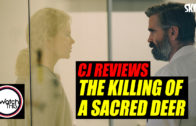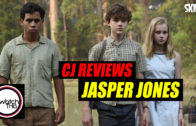Yorgos Lanthimos’s The Killing of a Sacred Deer is gripping, creepy, intense and wholly original. It slots beautifully into 2017 as The Year Of Intelligent Horror; it is also, easily, one of the best films of the year.
Colin Farrell, re-teaming with Lanthimos from last year’s The Lobster, plays a surgeon whose pretty idyllic family life – nice stone house, wonderful eye doctor wife, two smart and talented kids – is threatened. I’ll say no more; the terrific story deserves its own discovery. It is beautifully told, each element and development revealing itself surprisingly, often because a masterful piece of misdirection has already been laid. We consistently think we’re ahead of the film, but actually, the film is always way ahead of us.
Lanthimos unashamedly borrows from Kubrick’s The Shining, which I have no problem with: steal and steal from the best! He utilises zooms (both towards and withdrawing), a similar sound design (including a musical score of existing pieces that are obviously evocative of the score of The Shining) and even casts a boy actor, Sunny Suljic, who is evocative of Danny Lloyd (Danny) in Kubrick’s masterpiece. But this may be as “meta” as the film gets; structurally and tonally, it is far more coherent, concrete and conventional that The Lobster. Indeed, one might say it is simply a vastly superior horror film… like The Shining.
The entire cast nail Lanthimos’ dry, unemotionally-laden line deliveries, but never to the point of distancing us from the seriously disturbing material. Nicole Kidman and Farrell are excellent as are Suljic and Raffey Cassidy as their kids, while Barry Keoghan, in the film’s other major role, gives one of the best supporting performances of the year. It is astonishing that all three of the latter are British (the film takes place in an unidentified US city).
The film is thematically rich and pungent, looking deep into marriage, family, ethics, morals and trust. Most immediately, it asks that classic question, “What would you do to protect your family?” – but you’ve never seen it asked like this. Outstanding.
Category: FILM & TV














